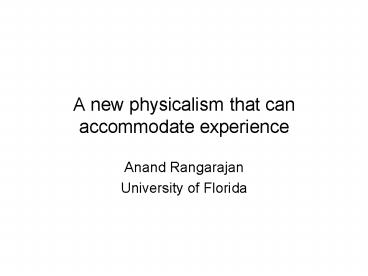A new physicalism that can accommodate experience - PowerPoint PPT Presentation
Title:
A new physicalism that can accommodate experience
Description:
A new physicalism that can accommodate experience Anand Rangarajan University of Florida – PowerPoint PPT presentation
Number of Views:90
Avg rating:3.0/5.0
Title: A new physicalism that can accommodate experience
1
A new physicalism that can accommodate experience
- Anand Rangarajan
- University of Florida
2
The Problem of Experience
- Inadequacy of present day science to deal with
consciousness. - Varieties of materialism unsatisfactory.
- Recent challenge from analytic philosophy
- Consciousness not logically supervenient on the
physical (David Chalmers). - Varieties of idealism, panpsychism, dualism now
back on the table.
3
Approaches - a survey
- Materialism
- Emergence
- Dualism
- Idealism
- Dual-aspect theories
- Panpsychism
- ????
4
Logical Supervenience
- Consciousness not logically supervenient on the
physical, Chalmers 1996. - Consciousness logically supervenient on the
physical, Stoljar 2006. - Contradictory on the surface.
- Both point to a new physicalism.
5
A new physicalism
- Almost everything is logically supervenient on
the physical. - Exception Experience.
- A Move Construct a new physicalism that can
accommodate experience. - Explanatory gap Why should the new physicalism
entail experience?
6
A multiverse of possibilities
- All that physics specifies is a measure on a set
of possibilities or possible worlds. - Slogan Multiverse as a quantum computer (Lloyd
2006). - Without an additional mechanism, multiverse has
only possibilities - no actualities. - Decoherence not fully worked out.
7
Do possibilities exist?
- Elitzur-Vaidman bomb testing experiment
If bomb is a dud, only D detects photon If only C
detects the photon, bomb is not a dud
Destructive interference at C only because both
possibilities exist
8
Phenomenology
- Pure experience prior to cognitive elaboration
(Husserl 1910). - Severely criticized by post-structuralism
(Foucault 70). - Myth of the given (Sellars 56).
- Can phenomenology be separated from point of view
or perspective? - For us, no.
9
Perspectives
- Nietzschean and otherwise
- Point of view
- Conceptual frame of reference
- Orients phenomenology - controversial.
- Modal logic system S5 perspectives (Hales)
- Physical perspectives?
10
Perspectives and Content
- Given a set of possibilities and a measure on
them, conceive of perspective as an operator. - Perspectives operate on possibilities or possible
worlds. - Interaction generates experience (among other
things).
11
A Conceptual Contrast
Perspectives Multiverse
Biased Restricts set of possibilities Unbiased Allows all possibilities to exist
Local Centered on here and now Global Possible spacetimes included
Top down Operates on the multiverse Bottom up Informs all perspectives
Probability Perspectives generate measure on possibilities Possibilities Multiverse generates possibilities
12
Foucault and Nagarjuna
- Scientific picture as construct
- Emergence of postmodern science?
- Shunyata as antidote to reification
- Emergence of tantra?
13
Perspectives and the Multiverse
- Need a bottom up physics to specify a measure
on a set of possibilities or possible worlds
Check - Need a top down physics to specify a set of
perspectives to operate on the possible worlds
Check - Each perspective has a point of view with actual
phenomenal content Experience
14
A Story
We were once a simple, modern people
Postmodernism and Quantum Gravity All that is
Solid melts into Air
Is this PerVerse?
15
Discussion
- Perspectives operate on the multiverse
- The multiverse informs perspectives
- What are the relationships between the multiverse
and perspectives? - Perspectives supervenient on the multiverse
Informationalism? - Multiverse supervenient on perspectives
Relativism? - Non-reductive and circular relationship?
16
References
- The Conscious Mind In Search of a Fundamental
Theory, David J. Chalmers, Oxford University
Press, 1996. - Order of Things An Archaeology of the Human
Sciences, Michel Foucault, Routledge Classics,
2001. - The Fundamental Wisdom of the Middle Way
Nagarjunas Mulamadhyamakakarika, Jay L.
Garfield, Oxford University Press, 1995. - The Disinterested Witness A Fragment of Advaita
Vedanta Phenomenology, Bina Gupa, Northwestern
University Press, 1998. - Nietzsches Perspectivism, Steven D. Hales and
Rex Welshon, University of Illinois Press, 2000. - Programming the Universe A Quantum Computer
Scientist Takes on the Cosmos, Seth Lloyd, Alfred
A. Knopf, 2006. - Ignorance and Imagination The Epistemic Origin
of the Problem of Consciousness, Daniel Stoljar,
Oxford University Press, 2006. - Integral Spirituality, Ken Wilber, Integral
Books, 2006.































